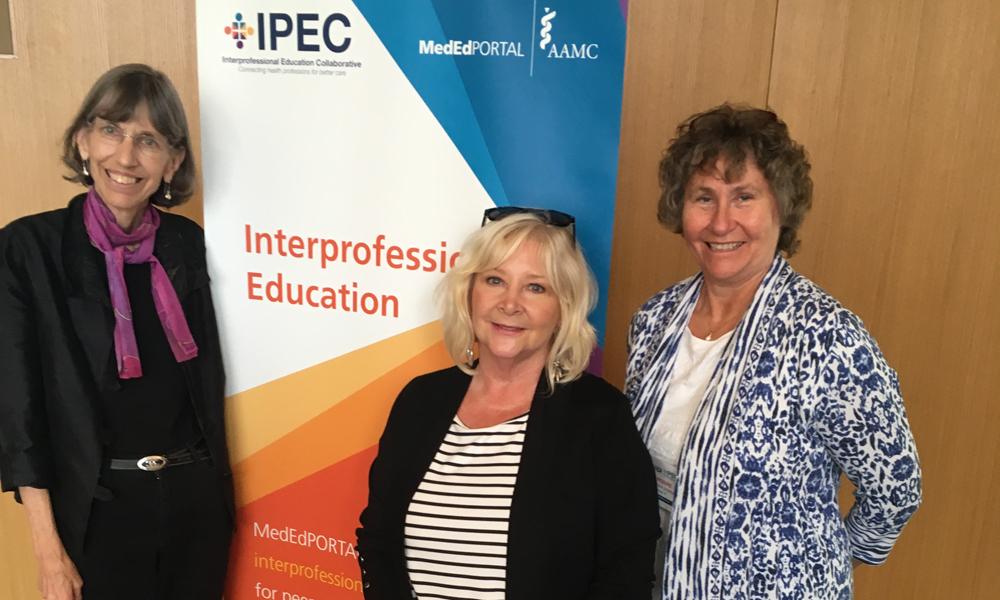SAMHSA grant funds interprofessional training
News
The national opioid crisis is mobilizing higher education to better prepare students in healthcare programs for the challenges they will face as professionals. The recent award of a $200K grant from the Substance Abuse and Mental Health Services Administration (SAMSHA) will help position James Madison University to become a leader in Substance Use Disorder (SUD) education and training.
The idea to seek the grant was rooted in conversations during the SAMHSA IPEC conference attended by Debi Kipps-Vaughan (school psychology), Emily Akerson (IIHHS) and Lisa McGuire (social work) in August 2018. In a working session at the end of the conference, they created a plan to help faculty integrate new evidence-based practices and approaches for SUD interventions into current course materials. They surmised that adding the latest methodologies into the existing curriculum would allow students to become better prepared to offer services as professionals.
After the conference, Kipps-Vaughan, Akerson and McGuire along with Erica Lewis (nursing) began putting the plan into action at JMU. Receiving the grant allowed the creation of James Madison University Substance Use Disorder Education (JMU-SUDE), an interprofessional training program designed to develop the knowledge, skills and attitudes required for treatment of SUD. The curriculum will be shared across 10 academic units and programs within the College of Health and Behavioral Studies (CHBS).
To kick-start the effort, the JMU-SUDE advisory board has identified ‘champions’ in each academic unit to review their existing curriculum and develop new SUD-related learning activities to be included in current classes. “What graduate psychology wants to provide for our students is going to look different than what nursing wants to provide, and what OT wants to provide and so on and so on. There is a core training piece called SBIRT (Screening, Brief Intervention, and Referral to Treatment) as a model that is accepted nationally for substance use disorder education. Everyone would be exposed to and trained in the SBIRT model, but then the areas of curriculum beyond that would be specific to the professional needs of the different programs and departments,” said Kipps-Vaughan.
Advisory board member, Erica Lewis will also act as the ‘SUDE Champion’ for the School of Nursing’s graduate program. “There is a clear problem with addiction in the United States and also a lack of appropriate clinical management for both addiction and pain. Creating evidence-based education for students is an important step towards addressing those problems.” Lewis explained.
Interdisciplinary collaborative work is highly valued within CHBS, recognizing that in professional practice, providers must work with practitioners outside their discipline. For several years, an Interprofessional Education (IPE) conference has been held, bringing together students from different programs in order to tackle real life problems. Kipps-Vaughan explained, “I think that's one of the reasons why JMU was successful in obtaining this grant is because we already have a long history and a strong interprofessional education collaborative on campus.”
McGuire went on to add, “Although there has been increased awareness of the importance of involving social work in health issues, I truly believe that if we do not utilize the best knowledge and skills of ALL the professions, we are not likely to be successful.”
After the curriculum is developed, faculty will be trained on its implementation during a conference scheduled for Fall 2020. The first coursework using the updated curriculum will begin during the spring 2021 semester.
During the second year of the grant project, additional phases will include designing training for new faculty and presenting students with a full year of updated curriculum. This project is designed to be sustainable even after the grant period is over.
Bringing a project of this scope to fruition has been an endeavor. McGuire comments, “It took some real perseverance to get funding for this project and I look forward to moving from a concept into the activities that will make a positive impact on faculty, students and the greater community!”
There are many opportunities for interested faculty to become involved in the project and Kipps-Vaughan welcomes inquiries. She affirms, “I don't want us to ever get away from the core of the expectation of this grant, yes, it is to provide this training. But the bigger picture is to really help individuals with addictions improve their lives and opportunities to live well.”
